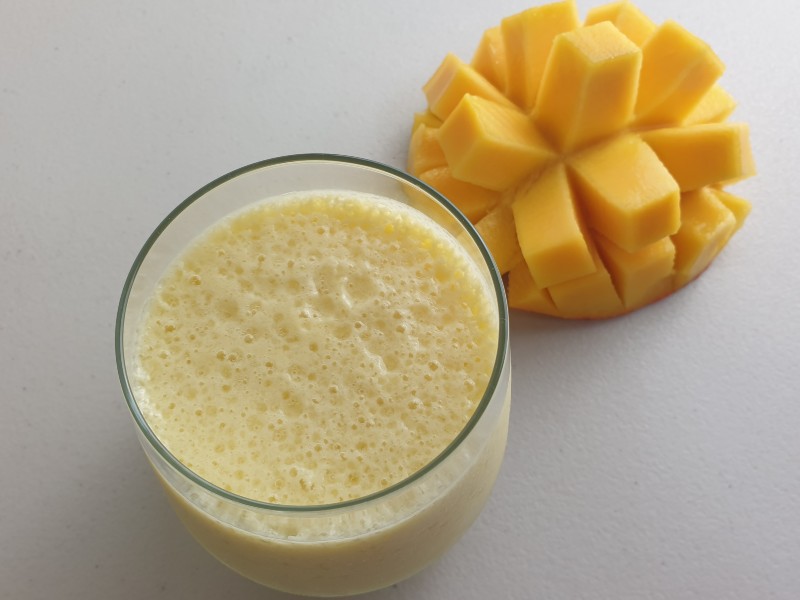
Mango
Benefits and Recipes
Nutritional Benefits of Mango:
According to article from Mr. Ryan Raman (MS.RD) and Cecilla Snyder (MS.RD) updated on 1st February 2023, and is published on “Healthline“, Mango,
To listen to this article, click below button:1. Mango aids immunity, iron absorption and body growth and repair. Mango is low in calories yet high in nutrients — particularly vitamin C, which aids immunity, iron absorption and cell growth and repair. Other supporting immunity plants.
Other supporting immunity plants.
2. Fresh mango is low in calories. A one cup (165 gram) serving of mango contains fewer than 100 calories. Its low calorie density makes it a great choice if you’re looking to reduce your calorie intake while still feeling full and satisfied.
3. Mango may help prevent diabetes. As long as you eat fresh mango in moderate amounts, it will likely reduce your risk of developing diabetes. Keep in mind that fresh mango does not contain as much sugar per serving as dried mango does. Other natural foods that may be good for diabetes.
Other natural foods that may be good for diabetes.
4. Mango is high in plant compounds that act as antioxidants to protect your body. Mango has over a dozen different types of polyphenols, including mangiferin, which is especially powerful. Polyphenols function as antioxidants inside your body. Antioxidants are important to protect your cells against free radical damage. Research has linked free radical damage to signs of aging and chronic diseases. Other anti-aging natural foods.
Other anti-aging natural foods. Other natural foods that may prevent chronic diseases.
Other natural foods that may prevent chronic diseases.
5. Mango contains immune-boosting nutrients. Mango is a good source of folate, several B vitamins, as well as vitamins A, C, K, and E. — all of which may help boost immunity. Vitamin A reduces risk of infection. Vitamin C can help your body produce more disease-fighting white blood cells, help these cells work more effectively, and improve your skin’s defences. Other supporting immunity plants.
Other supporting immunity plants. Other skin care and anti-aging natural foods.
Other skin care and anti-aging natural foods.
6. Mango may support heart health. Mango contains magnesium, potassium, and the antioxidant mangiferin. The nutrients help lower blood pressure, protect heart cells against inflammation, oxidative stress and cell death, as well as helping lower cholesterol, triglycerides and free acids. All of these supports healthy heart function. Other helping heart natural foods.
Other helping heart natural foods. Other natural foods that help to control blood pressure.
Other natural foods that help to control blood pressure. Other natural foods that may help to control cholesterol.
Other natural foods that may help to control cholesterol. Other anti-inflammatory natural foods.
Other anti-inflammatory natural foods.
7. Mango may improve digestive health. Mango has digestive enzymes, water, dietary fiber, and other compounds that aid various aspects of digestive health. Other digestive healthy food.
Other digestive healthy food.
8. Mango may support eye health. Mango contains lutein, zeaxanthin, and vitamin A, all of which support eye health. Lutein and zeaxanthin act as a natural sunblock, absorbing excess light. In addition, they appear to protect your eyes from harmful blue light. A lack of dietary vitamin A has been linked to dry eyes and nighttime blindness. Severe deficiencies in vitamin A can cause more serious issues, such as corneal scarring. Other natural loving eyes foods.
Other natural loving eyes foods.
9. Mango may help lower your risk of certain cancers. Mango polyphenols may fight oxidative stress, which is linked to many health conditions, including colon, lung, prostate, breast, and bone cancers. Other natural foods that may go against cancer.
Other natural foods that may go against cancer. Other defending colon cancer natural foods.
Other defending colon cancer natural foods. Other defending lung cancer natural foods.
Other defending lung cancer natural foods. Other defending prostate cancer natural foods.
Other defending prostate cancer natural foods. Other defending breast cancer natural foods.
Other defending breast cancer natural foods.
Be aware of mango allergies. According to article on “very well health “, Mango allergies can trigger a rash or a more severe reaction known as anaphylaxis. Most people tend to be allergic to the urushiol oil in the peel of the mango.
 Editor’s view (Click to read more)
Editor’s view (Click to read more) Consumption of new food (Click to read more)
Consumption of new food (Click to read more)
 Do you know? Heterocyclic amine is a chemical that is formed when meat, poultry, or fish is cooked at high temperatures, such as frying, boiling, and barbecuing. “Heterocyclic amines” are carcinogens (substances that may cause cancer). It is also called HCA. Source: National Cancer Institute (of United States)
Do you know? Heterocyclic amine is a chemical that is formed when meat, poultry, or fish is cooked at high temperatures, such as frying, boiling, and barbecuing. “Heterocyclic amines” are carcinogens (substances that may cause cancer). It is also called HCA. Source: National Cancer Institute (of United States)

